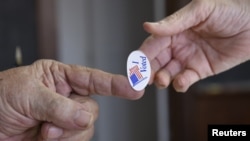Super Tuesday is known as the biggest day ahead of the U.S. presidential election, with at least 11 states and one U.S. territory (American Samoa) casting votes for their chosen primary candidate.
But even though Super Tuesday has all the attention of candidates and voters right now, after it's over, both parties have plenty to look forward to.
Over the month of March alone, there are 26 primaries or caucuses.
On March 5, there will be five states up for grabs. The Democratic and Republican candidates will be competing for delegates in Kansas and Louisiana, with Democrats additionally vying for votes in Nebraska and Republicans in Kentucky and Maine.
The biggest prize of that day is Louisiana, with 46 delegates for the Republicans and 59 for the Democrats.
Delegate count
Former Secretary of State Hillary Clinton is hoping that Super Tuesday will give her a huge lead over Bernie Sanders. She has strong support in the Southern states.
For the Republicans, the stakes are even higher.
About half of the delegates needed to win the Republican nomination are in play, but Super Tuesday delegates are awarded proportionally, so no one candidate could win all of them.
However, front-runner Donald Trump could win a big enough portion of the total delegates to cinch the nomination if he wins a large enough percentage in each state.
Although the day is certainly not to be underestimated, the Super Tuesday victories and defeats have the potential to be short-lived for each party's candidates. After all, there are many more contests ahead.












